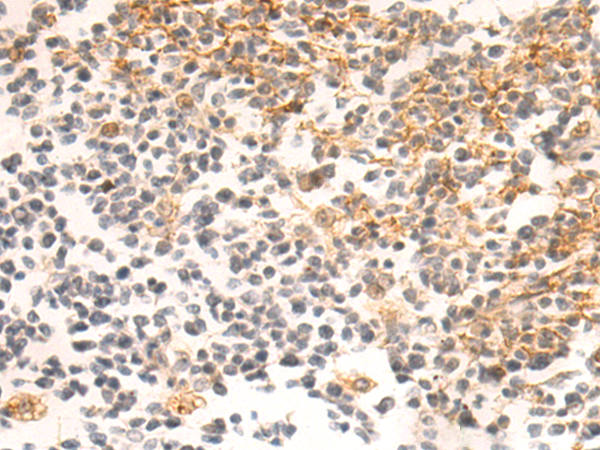
| WB | 咨询技术 | Human,Mouse,Rat |
| IF | 咨询技术 | Human,Mouse,Rat |
| IHC | 1/50-1/100 | Human,Mouse,Rat |
| ICC | 技术咨询 | Human,Mouse,Rat |
| FCM | 咨询技术 | Human,Mouse,Rat |
| Elisa | 1/5000-1/10000 | Human,Mouse,Rat |
| Aliases | PLC; SJA; SJS; HSPG; SJS1; PRCAN |
| Host/Isotype | Rabbit IgG |
| Antibody Type | Primary antibody |
| Storage | Store at 4°C short term. Aliquot and store at -20°C long term. Avoid freeze/thaw cycles. |
| Species Reactivity | Human, Mouse |
| Immunogen | Synthetic peptide of human HSPG2 |
| Formulation | Purified antibody in PBS with 0.05% sodium azide and 50% glycerol. |
+ +
以下是关于HSPG2抗体的3篇参考文献示例(注:文献信息为示例性质,实际引用请核实真实来源):
---
1. **文献名称**:*HSPG2/Perlecan Antibody Reveals Stromal Expression as a Prognostic Marker in Colorectal Cancer*
**作者**:Miller, J. et al.
**摘要**:该研究通过免疫组化分析发现,HSPG2在结直肠癌基质中高表达,与肿瘤侵袭性和患者生存率降低显著相关,提示其作为潜在预后生物标志物的价值。
---
2. **文献名称**:*Immunolocalization of Mutant HSPG2 in Schwartz-Jampel Syndrome Using a Novel Monoclonal Antibody*
**作者**:Tanaka, R. et al.
**摘要**:研究团队开发了一种特异性抗HSPG2单克隆抗体,用于分析Schwartz-Jampel综合征患者的肌肉组织,发现突变蛋白的异常定位与疾病严重程度相关。
---
3. **文献名称**:*HSPG2 Antibody Blockade Inhibits Angiogenesis in Tumor Microenvironment Models*
**作者**:Gupta, S. et al.
**摘要**:通过体外和小鼠模型实验,研究发现HSPG2抗体可阻断肿瘤微环境中血管内皮生长因子(VEGF)的信号传导,显著抑制血管生成和肿瘤生长。
---
如需用于学术用途,建议通过PubMed或Google Scholar检索最新文献,关键词如“HSPG2 antibody”或“perlecan immunohistochemistry”。
The HSPG2 antibody targets heparan sulfate proteoglycan 2 (HSPG2), also known as perlecan, a large multidomain proteoglycan encoded by the HSPG2 gene. HSPG2 is a key component of the basement membrane and extracellular matrix, playing critical roles in cell adhesion, signaling, and tissue integrity by interacting with growth factors, cytokines, and structural proteins like collagen. It is widely expressed in vascular, cartilaginous, and epithelial tissues. Antibodies against HSPG2 are essential tools for studying its biological functions, localization, and expression patterns in normal and diseased states.
HSPG2 dysregulation is linked to genetic disorders such as Schwartz-Jampel syndrome (a neuromuscular condition) and certain cancers, where altered expression may influence tumor progression, angiogenesis, or metastasis. Researchers use HSPG2 antibodies in techniques like Western blotting, immunohistochemistry, and immunofluorescence to investigate its involvement in these pathologies. Additionally, these antibodies have potential therapeutic applications, including targeting HSPG2 in tumor microenvironments or monitoring disease biomarkers.
Quality validation (e.g., specificity, cross-reactivity) is crucial for HSPG2 antibodies due to structural complexity and splice variants. Ongoing research explores their utility in regenerative medicine and drug delivery systems leveraging HSPG2’s binding properties.
×